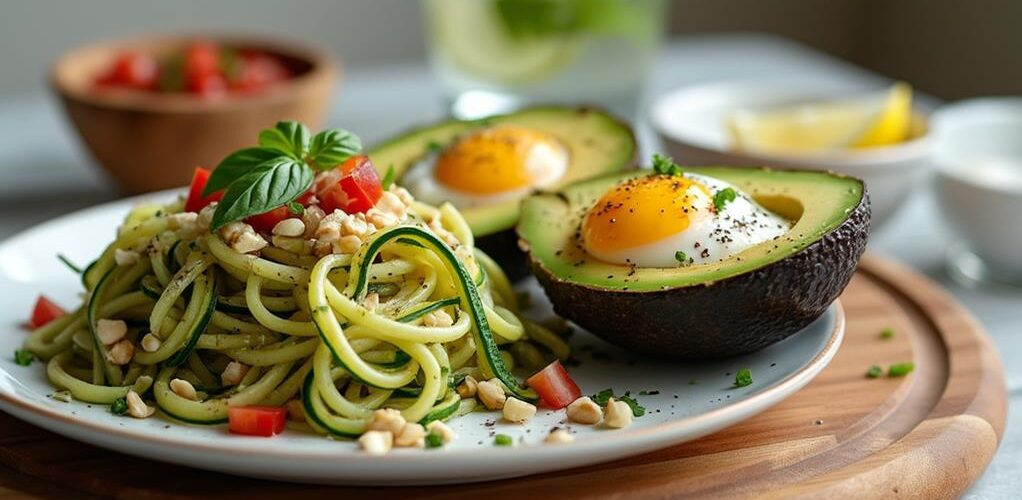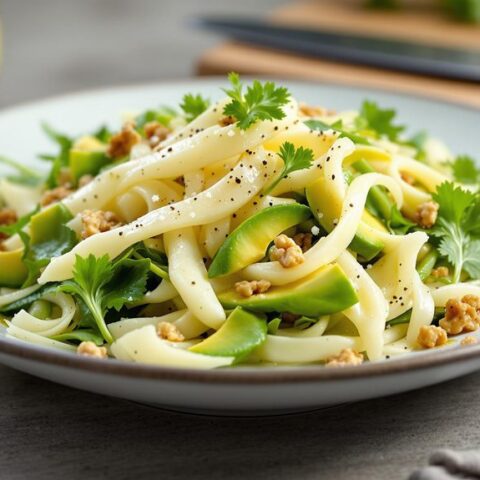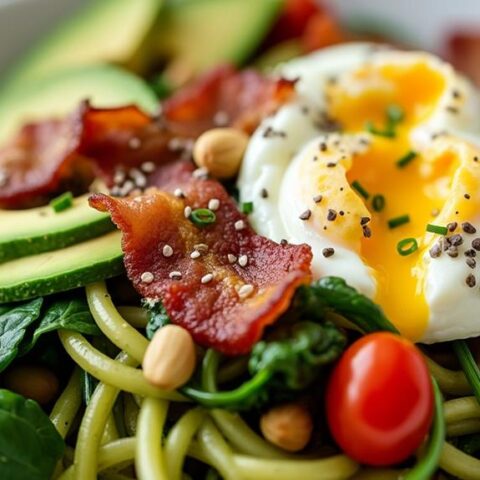
When following a keto diet, focus on nutrient-dense foods like fatty fish, meat and poultry, eggs, cheese, and avocado. Fatty fish such as salmon are rich in omega-3s and contain zero carbohydrates, promoting heart health. Meat and poultry offer high-quality proteins essential for muscle preservation, while eggs provide a low-carb, high-protein option supporting cognitive function. Cheese contributes fats with negligible carbs, enhancing dietary diversity and bone health. Finally, avocados are low in carbs and high in healthy fats and fibers, aiding digestion and satiety. These foods form the backbone of a balanced keto meal plan, ensuring varied nutritional benefits.
Key Takeaways
- Fatty fish offers omega-3s, essential nutrients, and zero carbs, ideal for heart health and keto diets.
- Meat and poultry provide high-quality protein and healthy fats with zero carbohydrates, supporting muscle preservation.
- Eggs are low-carb, high-protein, aiding in appetite control and enhancing cognitive function.
- Cheese delivers high fat and protein with minimal carbs, enriching meals and supporting bone health.
- Avocados are rich in monounsaturated fats, fiber, and potassium, promoting satiety and heart health.
Fatty Fish
In the domain of ketogenic diets, fatty fish stands out as an exemplary food choice due to its rich composition of omega-3 fatty acids and minimal carbohydrate content. Salmon, mackerel, and sardines are prime examples, offering substantial health benefits while fitting seamlessly into a keto regimen.
Omega-3 fatty acids, prevalent in these fish, are renowned for promoting heart and brain health. They achieve this by reducing inflammation, a key factor in chronic diseases such as arthritis and cardiovascular disorders. Additionally, increasing omega-3 fatty acids from such sources can benefit heart health, aligning with the nutritional adjustments recommended for those on a keto diet.
Regular consumption of fatty fish, with recommendations of 2-3 servings per week, has been linked not only to inflammation reduction but also to improved mood and overall well-being.
A 100g serving of salmon, for instance, provides approximately 26g of protein and 11.8g of fat, without any carbohydrates. This macronutrient profile supports the ketogenic goal of high fat and adequate protein intake while minimizing carbohydrates.
Additionally, fatty fish are rich in essential nutrients like vitamin D and selenium, enhancing the nutritional balance of a keto diet. The high-fat content in these fish promotes satiety, reducing overall calorie intake, and supporting weight loss goals.
Consequently, incorporating fatty fish into a ketogenic diet offers a strategic approach to achieving both health and dietary objectives.
Meat and Poultry
Building upon the nutritional advantages offered by fatty fish, meat and poultry serve as another cornerstone in the ketogenic diet. These foods, including chicken, beef, and pork, are devoid of carbohydrates and provide high-quality protein essential for muscle preservation.
Chicken breast, for instance, offers around 31.1g of protein per 3-ounce serving with zero carbs, making it an ideal choice for keto enthusiasts. The inclusion of grass-fed beef is particularly advantageous, given its heightened levels of omega-3 fatty acids and conjugated linoleic acid (CLA), both of which may support fat loss and enhance overall health. The grass-fed benefits extend beyond nutritional value, promoting a more sustainable and ethically conscious dietary choice.
Skin-on poultry, such as chicken thighs, is a versatile option that contributes healthy fats to the diet and is adaptable to various poultry recipes suitable for keto. These recipes can maintain flavor and satiety while adhering to low-carb principles.
However, caution is advised with processed meats like bacon and sausage, as they may contain hidden sugars or additives. Opting for minimally processed versions guarantees adherence to dietary goals.
Regular consumption of meat and poultry not only aids in maintaining energy levels but also promotes satiety, facilitating sustained adherence to a ketogenic lifestyle. Consequently, these protein-rich options are essential for those following a low-carb regimen.
Eggs
Eggs represent a cornerstone of nutritional excellence within the ketogenic diet, offering a low-carb, high-protein option that is both versatile and nutrient-dense. Each large egg contains less than 1 gram of carbohydrates and approximately 6 grams of protein, making them ideal for keto adherents seeking to maintain low carbohydrate intake while guaranteeing adequate protein consumption.
In addition to their macronutrient profile, eggs support cognitive enhancement thanks to essential vitamins found in the yolk. These vitamins, including choline, selenium, and B vitamins, play a role in brain health and antioxidant defense.
Incorporating eggs into a ketogenic diet can also aid in appetite control and weight management. Research indicates that consuming eggs can trigger hormones that enhance satiety, thereby reducing overall calorie intake.
Moreover, the cholesterol content in egg yolks, once a concern, has not been associated with increased heart disease risk, aligning them with modern dietary guidelines.
The versatility of eggs allows them to be seamlessly integrated into a variety of egg recipes suitable for a keto diet, such as boiled, scrambled, or baked dishes. This adaptability guarantees that eggs remain a staple in diverse meal preparations, providing both nutritional benefits and culinary flexibility.
Cheese
Cheese lovers will find this dairy delight to be a perfect match for the ketogenic diet, thanks to its high fat and protein content paired with negligible carbohydrates. For instance, cheddar cheese, a staple in many households, provides an impressive 25.4g of protein and only 0.1g of carbohydrates per 100g serving, making it a prime choice for those adhering to a low-carb lifestyle.
The diverse range of cheese varieties, including mozzarella, blue cheese, and cream cheese, not only enhances flavor but also contributes to nutritional diversity without compromising the diet's carbohydrate restrictions. Some keto cheeses, like Brie and mascarpone, offer low-carb options that enhance meal richness.
Incorporating cheese into meals can also bolster calcium intake, an essential mineral for maintaining bone health. Additionally, cheese contains conjugated linoleic acid (CLA), which has been associated with fat loss, offering an additional advantage for individuals focused on weight management. The satiating nature of moderate cheese consumption can help manage hunger, supporting adherence to the diet.
Strategic cheese pairings can boost the keto culinary experience, with blue cheese complementing walnuts or cream cheese enhancing smoked salmon dishes.
Avocado
Among the many foods that complement a ketogenic lifestyle, avocados stand out due to their impressive nutritional profile. Known for their low carbohydrate content, avocados contain approximately 2 grams of net carbs per fruit, making them an ideal choice for those adhering to a keto diet. They are also rich in healthy monounsaturated fats, providing about 19.7 grams of fat per avocado. This component is essential, as it promotes satiety and supports heart health, both vital factors in a balanced diet.
Furthermore, avocados are an excellent source of potassium, containing roughly 975 milligrams in one medium fruit. This high potassium content aids in maintaining proper electrolyte balance, which is particularly important for individuals on a keto diet who may be prone to imbalances. Additionally, avocados supply essential nutrients such as B vitamins and about 13 grams of fiber, contributing notably to digestive health.
Incorporating avocados into various dishes can enhance both flavor and nutritional value. Popular avocado recipes include salads, smoothies, and spreads.
| Nutrient | Amount per Avocado | Keto Benefit |
|---|---|---|
| Net Carbs | 2 grams | Low carb content |
| Healthy Fats | 19.7 grams | Promotes satiety |
| Potassium | 975 milligrams | Electrolyte balance |
| Fiber | 13 grams | Supports digestion |
Avocado benefits in these recipes are numerous, making them a staple in keto-friendly meals.
Frequently Asked Questions
What Are the Top 5 Keto Foods?
For keto snack ideas and keto meal prep, consider incorporating fatty fish, eggs, avocados, cheese, and non-starchy vegetables. These foods are nutrient-dense, low in carbohydrates, and support satiety and heart health within a ketogenic framework.
What Foods Can You Eat Freely on Keto?
On a ketogenic diet, foods that can be consumed freely include keto-friendly snacks such as nuts and seeds, along with low-carb vegetables like spinach and broccoli. These options provide essential nutrients while maintaining low carbohydrate intake.
What Foods Can You Eat All You Want on Keto?
On a keto diet, non-starchy vegetables, fatty fish, meats, and healthy fats are ideal for unlimited consumption. These foods support keto snacks and meal prepping, providing nutritional balance with low carbohydrate content, promoting health benefits.
What Is the Most Filling Food on Keto?
Determining the most filling food on keto involves considering keto satiety strategies. High fat options like avocados and cheese, along with protein-rich eggs and fatty fish, effectively enhance fullness due to their balanced macronutrient profiles and nutritional density.
Conclusion
In conclusion, the ketogenic diet emphasizes the consumption of high-fat, moderate-protein, and low-carbohydrate foods. Fatty fish, meat and poultry, eggs, cheese, and avocados are integral components due to their nutrient density and compatibility with ketosis. These foods provide essential fats, proteins, and micronutrients while maintaining low carbohydrate intake, which is vital for metabolic adaptation. An evidence-based approach to these dietary choices can support the maintenance of ketosis and potentially offer various health benefits associated with the keto diet.









No Comments